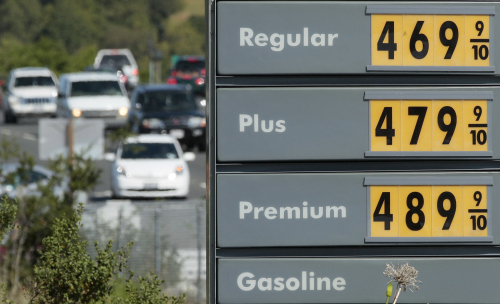Rapid spike in layoffs heightens concerns that pricier gas is slowing U.S. economy
WASHINGTON (AP) ― A renewed rise in layoffs is the latest sign that higher fuel prices may be slowing the economy.
A 23 percent spike in applications for unemployment benefits over the past month suggests that hiring may look weaker when the government issues the April jobs report Friday.
Oil prices plummeted Thursday to settle below $100 a barrel for the first time since mid-March. The decline follows a turbulent stretch in which oil rose 35 percent from mid-February through the end of April. Still, the plunge in oil may be enough only to keep pump prices from reaching a national average of $4 per gallon
Most analysts agree the economy has strengthened enough to keep growing this year. But gas prices have risen for 44 straight days. Consumers are spending more to fill the tanks, leaving them with less to spend elsewhere. As a result, many companies are feeling less certain about the economy’s health and could delay hiring plans.
 |
A price board is shown at a Shell gas station in Novato, California on Thursday. (AP-Yonhap News) |
“We have found that higher gas prices can lead to a slowdown in the pace of hiring,” said Daniel Silver, an economist at JPMorgan Chase.
Applications rose last week to a seasonally adjusted 474,000, an eight-month high. A Labor Department spokesman said the spike was largely the result of unusual factors, including a high number of school systems in New York that closed for spring break.
Still, applications have risen by nearly 100,000 from February’s three-year low of 375,000 ― a figure typically consistent with sustainable job growth.
The third rise in four weeks also contributed Thursday to a sell-off on Wall Street. The Dow Jones industrial average fell 139 points to close down at 12,584 for the day, although the decline was also influenced by the drop in oil prices.
“The trend is clearly upward, so that’s disconcerting,” said Kurt Karl, chief U.S. economist for Swiss Re. “When you get three or four weeks in a row of special factors, they’re no longer so special.”
Most economists are sticking with their prediction for Friday’s employment report. The consensus view is the economy added 185,000 jobs in April and that the unemployment rate was unchanged at 8.8 percent. But the weaker data on layoffs and other recent reports have stirred concerns that the gains could shrink in the coming months.
The U.S. service sector, which employs 90 percent of the work force, grew last month at the slowest pace since August, according to a report this week from a private trade group. And the National Federation of Independent Business said Thursday that nearly twice as many firms cut jobs in April as added workers. The number of firms planning to create jobs over the next three months was also weak.
“Apparently, customers aren’t showing up,” said Bill Dunkelberg, chief economist at the NFIB.
Gas prices are weighing on consumers. The national average was $3.99 a gallon on Thursday, according to the “AAA.” That is 30 cents higher than a month earlier. The sustained surge is siphoning money away from other purchases.
Silver, the JPMorgan analyst, said higher gas prices are one reason he expects the economy added only 165,000 new jobs in April. That would be down from gains of 216,000 in March and 194,000 for February. Temporary shutdowns in the auto industry are another, Silver said.
The earthquake in Japan created a parts shortage that is affecting automakers. Honda Motor Corp. has reduced production at 10 of its U.S. and Canadian plants. Toyota has cut its U.S. production by two-thirds. Both have said they aren’t laying off workers.
Most analysts agree the economy has strengthened enough in recent months to keep growing. Auto sales have risen at a healthy clip this year. And retailers said Thursday that sales surged in April, though some that cater to low-income shoppers warned that their customers are struggling with higher gas prices.
U.S. companies squeezed more work out of their staffs in the first three months of the year, according to a separate Labor report. But the overall gain in productivity was much slower than in the previous three months.
A slowdown in productivity growth is bad for the economy if it persists for a long period. But it can be good in the short term when unemployment is high because it signals companies must hire more workers in order to make further gains.








![[Herald Interview] How Gopizza got big in India](http://res.heraldm.com/phpwas/restmb_idxmake.php?idx=644&simg=/content/image/2024/11/20/20241120050057_0.jpg)